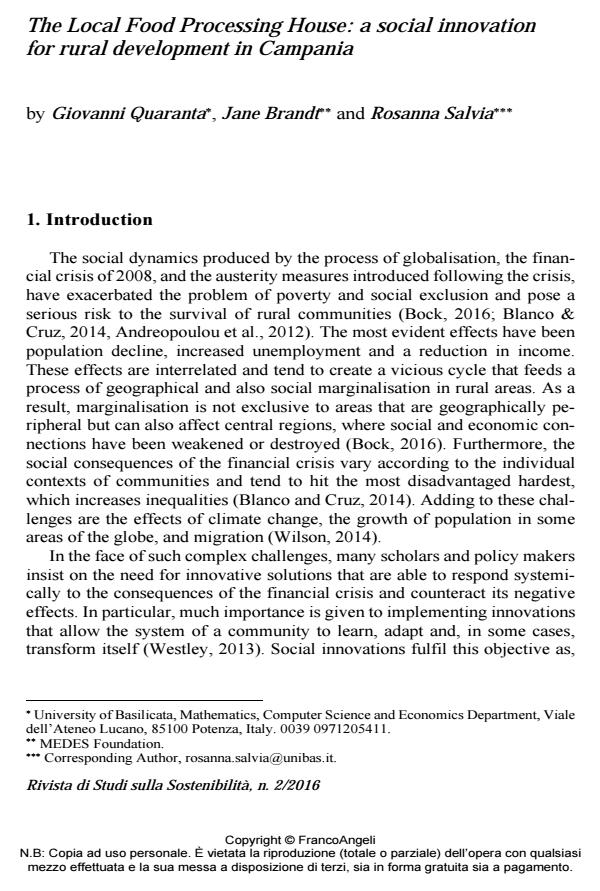The Local Food Processing House: a social innovation for rural development in Campania
Journal title RIVISTA DI STUDI SULLA SOSTENIBILITA'
Author/s Giovanni Quaranta, Jane Brandt, Rosanna Salvia
Publishing Year 2017 Issue 2016/2
Language English Pages 10 P. 227-236 File size 159 KB
DOI 10.3280/RISS2016-002020
DOI is like a bar code for intellectual property: to have more infomation
click here
Below, you can see the article first page
If you want to buy this article in PDF format, you can do it, following the instructions to buy download credits

FrancoAngeli is member of Publishers International Linking Association, Inc (PILA), a not-for-profit association which run the CrossRef service enabling links to and from online scholarly content.
Social innovation assigns importance to the social and relational aspect of the community development linking it to social interactions and cooperation. Collective actions are crucial not only to promote new solutions to the problems generated by the globalization and the financial crisis in rural areas, but also in supporting community resilience. This study focuses on an experience of social innovation in a southern Italian community, Caggiano, who has built around food a new path of development. The work analyses the mechanisms displayed and employed by the community to achieve cohesiveness and trust among different local actors and highlight how the social innovation implemented played a crucial role in promoting the development and the sustainability of the community.
Keywords: Social innovation, resilience, food processing, rural development
- Adams D., Hess D. (2008). Social innovation as a new public administration strategy in Proceedings of the 12th annual conference of the International Research Society for Public Management 26-28 March, Brisbane, pp. 1-8, http://www.irspm2008.bus.qut.edu.au/papers/documents/pdf/Hess& Adams-SocialinnovationasanewPublicAdministrationStrategy-IRSPM2008.pdf), accessed October, 20, 2016.
- Andreopoulou Z., Cesaretti G.P., Misso R. (2012). Sostenibilità dello sviluppo e territori rurali. In: Andreopoulou Z., Cesaretti G.P., Misso R. (eds.). Sostenibilità dello sviluppo e dimensione territoriale. Il ruolo dei sistemi regionali a vocazione rurale. Milano: FrancoAngeli.
- Blanco I., Cruz H. (2014). Crisis, urban segregation and social innovation in Catalonia. ECPR General Conference, Glasgow, 3-6 September.
- Bock B. (2016). Rural marginalisation and the role of social innovation: a turn towards exogenous development and rural reconnection. Sociologia Ruralis.
- Bosworth G., Rizzo F., Marquardt D., Strijker D., Haartsen T., Thuesen A.A. (2016). Identifying social innovations in European local rural development initiatives. Innovation. The European Journal of Social Science Research. DOI: 10.1080/13511610.2016.1176555
- Grybovych O., Hafermann D. (2010). Sustainable practices of community tourism planning: lessons from a remote community. Community Development, 41, 3.
- Istat, Istituto Nazionale di Statistica (2016). www.istat.it, accessed October, 21.
- Kirwan J., Ilber B., Maye D., Carey J. (2013). Grassroots social innovations and food localisation: An investigation of the Local Food programme in England. Global Environmental Change, 23: 830-837.
- Magis K. (2010). Community Resilience: An Indicator of Social Sustainability. Society & Natural Resources, 23, 5.
- Murray R., Caulier Grice J., Mulgan G. (2010). The Open Book of Social Innovation. United Kingdom: The Young Foundation.
- Neumeier S. (2012). Why do social innovations in rural development matter and should they be considered more seriously in rural development research? Proposal for a stronger focus on social innovations in rural development research. Sociologia Ruralis, 52: 48-69.
- Neumeier S. (2016). Social innovation in rural development: identifying the key factors of success. The Geographical Journal.
- Quilley S. (2011). Resilience Through Relocalization: Ecocultures of Transition? Transition to a post-carbon, post-consumer society: new, traditional and alternative ways of living in the ‘adjacent possible. Ecocultures Working Paper: 2012-1, University of Essex, UK, available at http://www.ecocultures.org/2012/02/resilience-through-relocalisation ecocultures-oftransition/.
- Salvia R., Quaranta G. (2016). Local based development and resilience: a lesson from a small community. Journal of Rural Studies, forthcoming.
- Seyfang G., Smith A. (2007). Grassroots innovations for sustainable development: towards a new research and policy agenda. Environmental Politics, 16: 584-603.
- Westley F. (2013). Social Innovation and Resilience: How One Enhances the Other, Supplement to SSIR funded by the Rockefeller foundation.
- Wilson G.A. (2014). Community resilience: path dependency, lock-in effects and transitional ruptures. Journal of Environmental Planning and Management, 57, 1: 1-26. DOI: 10.1080/09640568.2012.741519
Giovanni Quaranta, Jane Brandt, Rosanna Salvia, The Local Food Processing House: a social innovation for rural development in Campania in "RIVISTA DI STUDI SULLA SOSTENIBILITA'" 2/2016, pp 227-236, DOI: 10.3280/RISS2016-002020